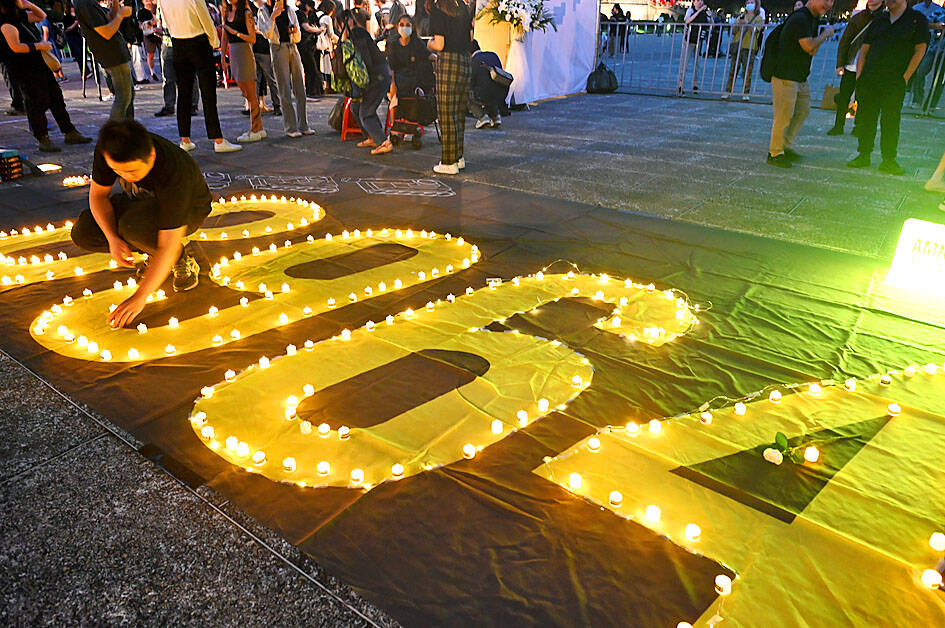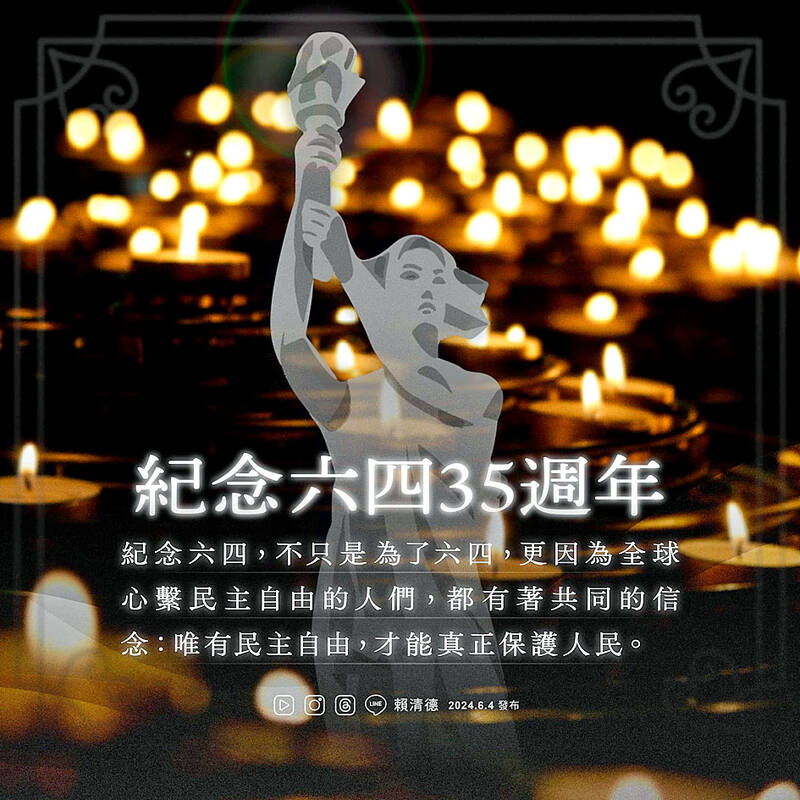Political leaders yesterday marked the 35th anniversary of the Tiananmen Square Massacre with declarations that mostly emphasized shoring up democracy at home or sympathy for the pursuit of freedom in China.
President William Lai (賴清德) in a Facebook post said the world was mesmerized by young Chinese standing up for freedom in Beijing 35 years ago as a tide of democracy swept through Asia.
Taiwan was blessed by its forebears whose sacrifices transformed the erstwhile dictatorship into a democracy, and by generations of young people who picked up the torch and continued the fight for freedom, Lai said.

Photo: Wang Yi-sung, Taipei Times
The lineage of youth activism in Taiwan ran from the Wild Lily and Wild Strawberry student movements to the Sunflower and Qingniao (bluebird) movements, Lai said, referring to the latest protests against controversial legislative reforms.
A nation truly worthy of respect is one in which people can freely speak their minds and any polity should bravely face the voice of the people, especially young people, he said.
Societal reform cannot occur without allowing a diversity of opinions and empowering young people to act as catalysts of change, Lai said, adding that the state should encourage and protect young people, not suppress them.

Photo: screen grab from William Lai’s Facebook page
Taiwan would continue to strive to preserve the memory of the massacre so that it would never vanish in the tide of history, he said.
“We are committed to forming a consensus with democracy, responding to dictatorship with freedom and courageously confronting the challenge of authoritarian expansionism with solidarity, and to cooperating with like-minded nations to make the world a better place,” Lai said.
Chinese Nationalist Party (KMT) Chairman Eric Chu (朱立倫) in a Facebook post said: “The two sides across the Taiwan Strait have never been closer in a historical moment and ideology than the days leading to June 4.”
Taiwanese students gathered at the Chiang Kai-shek Memorial in a gesture of support for their Chinese counterparts at Tiananmen Square, later bearing witness to the massacre, Chu said.
The ties that bind the two sides are not only history, culture and blood, but the pursuit of freedom, democracy, human dignity and other universal values, he said.
“We must remember June 4 because the two sides across the strait are still bound together in destiny and because this page of Chinese history must never be forgotten,” he said. “The KMT will forever stand beside those who pursue freedom and democracy as its friends and we will always defend the Republic of China.”
Taiwan People’s Party Chairman Ko Wen-je (柯文哲) in a Facebook post said: “A nation will not make progress if it does not confront difficult moments in its history.”
The Tiananmen Square Massacre created a trauma in the Chinese psyche that 35 years of economic progress cannot heal, Ko said.
The Taiwanese government did not apologize for the 228 Incident in 1947 for 48 years, he said, adding that the families of the victims, including his own, had suffered in silence during that time.
Ko spent his childhood watching his father quietly shed tears every Feb. 28, turning the date into a bitter one for him as well, he said.
“I share my feelings with friends across the Taiwan Strait, which is that there can be no forgiveness without truth, no reconciliation without forgiveness and no peace without reconciliation,” he said.
“The time has come to rehabilitate” the Tiananmen Square protesters, he added.
Additional reporting by Shih Hsiao-kuang

PREPAREDNESS: Given the difficulty of importing ammunition during wartime, the Ministry of National Defense said it would prioritize ‘coproduction’ partnerships A newly formed unit of the Marine Corps tasked with land-based security operations has recently replaced its aging, domestically produced rifles with more advanced, US-made M4A1 rifles, a source said yesterday. The unnamed source familiar with the matter said the First Security Battalion of the Marine Corps’ Air Defense and Base Guard Group has replaced its older T65K2 rifles, which have been in service since the late 1980s, with the newly received M4A1s. The source did not say exactly when the upgrade took place or how many M4A1s were issued to the battalion. The confirmation came after Chinese-language media reported

The Taiwanese passport ranked 33rd in a global listing of passports by convenience this month, rising three places from last month’s ranking, but matching its position in January last year. The Henley Passport Index, an international ranking of passports by the number of designations its holder can travel to without a visa, showed that the Taiwan passport enables holders to travel to 139 countries and territories without a visa. Singapore’s passport was ranked the most powerful with visa-free access to 192 destinations out of 227, according to the index published on Tuesday by UK-based migration investment consultancy firm Henley and Partners. Japan’s and

A Ministry of Foreign Affairs official yesterday said that a delegation that visited China for an APEC meeting did not receive any kind of treatment that downgraded Taiwan’s sovereignty. Department of International Organizations Director-General Jonathan Sun (孫儉元) said that he and a group of ministry officials visited Shenzhen, China, to attend the APEC Informal Senior Officials’ Meeting last month. The trip went “smoothly and safely” for all Taiwanese delegates, as the Chinese side arranged the trip in accordance with long-standing practices, Sun said at the ministry’s weekly briefing. The Taiwanese group did not encounter any political suppression, he said. Sun made the remarks when

BROAD AGREEMENT: The two are nearing a trade deal to reduce Taiwan’s tariff to 15% and a commitment for TSMC to build five more fabs, a ‘New York Times’ report said Taiwan and the US have reached a broad consensus on a trade deal, the Executive Yuan’s Office of Trade Negotiations said yesterday, after a report said that Washington is set to reduce Taiwan’s tariff rate to 15 percent. The New York Times on Monday reported that the two nations are nearing a trade deal to reduce Taiwan’s tariff rate to 15 percent and commit Taiwan Semiconductor Manufacturing Co (TSMC, 台積電) to building at least five more facilities in the US. “The agreement, which has been under negotiation for months, is being legally scrubbed and could be announced this month,” the paper said,